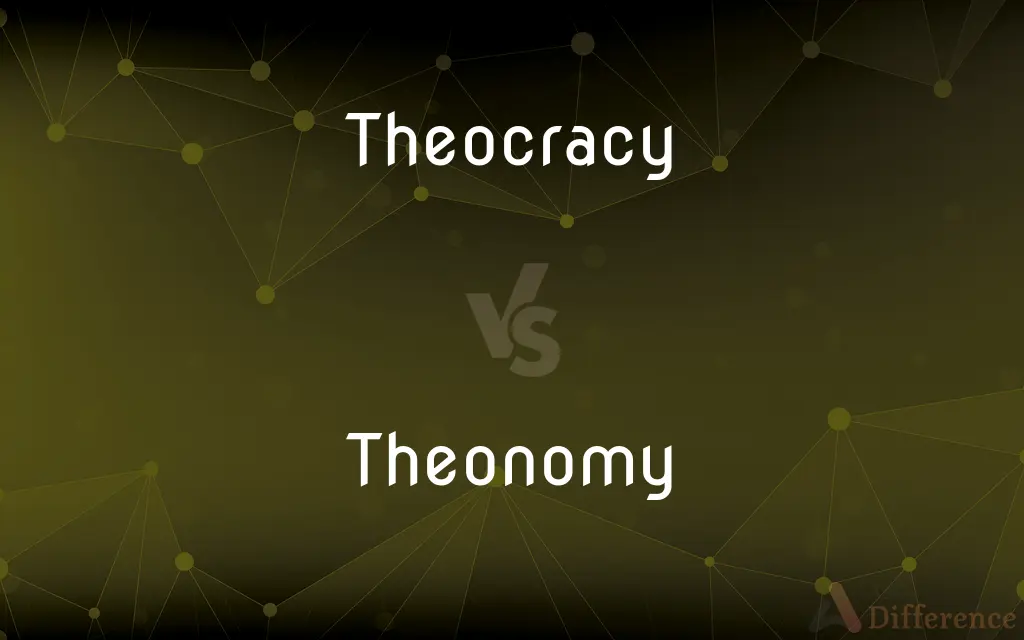Theocracy vs. Theonomy — What's the Difference?
By Fiza Rafique & Maham Liaqat — Updated on April 15, 2024
Theocracy is a form of government where priests rule in the name of God, while theonomy refers to a theological concept prescribing societies to be governed by divine law.

Difference Between Theocracy and Theonomy
Table of Contents
ADVERTISEMENT
Key Differences
Theocracy involves a government system where religious leaders hold the supreme power, often ruling in the name of a deity. On the other hand, theonomy is not a system of governance but a theological framework that advocates for the civil laws of a society to be based directly on biblical laws.
In theocracies, the laws of the state are often indistinguishable from religious commandments, and religious institutions may directly govern the state. Whereas, in theonomic thought, while civil laws should reflect biblical commands, the governance itself need not be directly by religious authorities.
Theocratic governments are historically seen in countries like Iran and the Vatican City, where religious texts and clerical leadership directly influence political decisions. On the other hand, theonomy, although not a form of government, influences legislative processes in some Christian communities, advocating for laws that mirror biblical statutes.
Supporters of theocracy believe that governance by divine guidance ensures moral and spiritual leadership. Conversely, proponents of theonomy may not necessarily support the direct rule by religious leaders but advocate for the moral principles of the Bible to shape civil legislation.
Theocracy can lead to a fusion of government and religion, potentially affecting religious minorities and governance. On the other hand, theonomy might influence certain laws or policies within a secular government, impacting society based on interpretations of biblical law.
ADVERTISEMENT
Comparison Chart
Definition
Government by religious leaders, claiming divine guidance.
Ideological belief in applying biblical laws to civil society.
Authority Source
Religious institutions and texts.
Biblical scriptures.
Governance Type
Direct rule by religious figures.
Influential in shaping laws, not directly ruling.
Example Entities
Iran, Vatican City.
No direct examples as it is not a form of governance.
Influence on Law
Religious law is civil law.
Biblical law should inform civil law.
Compare with Definitions
Theocracy
Political system based on religious authority.
Theocratic nations often have religious texts as their legal foundation.
Theonomy
Ideological stance where scripture informs law.
In theonomy, biblical commandments might shape public policies on morality.
Theocracy
A system where priests interpret divine will as law.
In the theocracy, laws are often revisions of ancient religious texts.
Theonomy
Theological principle advocating for divine law in society.
Theonomists argue that all societal laws should reflect biblical teachings.
Theocracy
Rule by those who claim divine guidance.
Leaders in a theocracy assert their authority is derived directly from a higher power.
Theonomy
Belief in biblical law guiding civil law.
Advocates of theonomy seek to influence legislation with principles derived from scripture.
Theocracy
Governance by religious institutions.
In some theocracies, the government's structure is identical to that of the leading religion.
Theonomy
Non-governance concept focusing on law's morality.
Theonomy does not propose a specific governance structure but a legal influence.
Theocracy
Government ruled directly by religious leaders.
In a theocracy, the country’s king might also be its top religious leader.
Theonomy
Framework for integrating scripture into civil legislation.
Supporters of theonomy often debate the extent of scripture’s influence on modern laws.
Theocracy
Theocracy is a form of government in which a deity of some type is recognized as the supreme ruling authority, giving divine guidance to human intermediaries that manage the day-to-day affairs of the government.The Imperial cult of ancient Rome identified Roman emperors and some members of their families with the divinely sanctioned authority (auctoritas) of the Roman State. The official offer of cultus to a living emperor acknowledged his office and rule as divinely approved and constitutional: his Principate should therefore demonstrate pious respect for traditional Republican deities and mores.
Theonomy
Theonomy, from theos (god) and nomos (law), is a hypothetical Christian form of government in which society is ruled by divine law. Theonomists hold that divine law, particularly the judicial laws of the Old Testament, should be observed by modern societies.
Theocracy
Government ruled by or subject to religious authority.
Theonomy
The state of being governed by God or in accordance with divine law.
Theocracy
A country or state governed in this way.
Theocracy
Government under the control of a state religion.
The Vatican City State is a Pope.
Theocracy
Rule by a god.
Theocracy
Government of a state by the immediate direction or administration of God; hence, the exercise of political authority by priests as representing the Deity.
Theocracy
The state thus governed, as the Hebrew commonwealth before it became a kingdom.
Theocracy
A political unit governed by a deity (or by officials thought to be divinely guided)
Theocracy
The belief in government by divine guidance
Common Curiosities
How does a theocracy impact the daily lives of its citizens?
In a theocracy, religious laws govern all aspects of life, from legal decisions to personal behaviors, influencing daily activities and rights.
Are there any countries that are governed by theonomy?
No, theonomy itself is not a system of government but a principle that can influence laws within various types of governments.
Can a theonomy exist within a secular government?
Yes, theonomy can influence certain laws or policies within a secular government, promoting biblical principles without establishing a theocracy.
What role do religious leaders play in a theocracy?
In a theocracy, religious leaders often hold supreme power, making key decisions about governance and laws based on their interpretation of religious texts.
What are some criticisms of theocracy?
Criticisms of theocracy often include the lack of separation between church and state, potential suppression of religious minorities, and the restriction of personal freedoms and human rights.
Can a theocracy coexist with other forms of government?
Typically, a theocracy stands alone as a distinct form of government where religious authority is paramount. It generally does not coexist with other forms of government that separate religion from state power.
What is the primary difference between theocracy and theonomy?
Theocracy is a form of governance by religious leaders, while theonomy is a belief that civil laws should be based on biblical laws.
Is theonomy compatible with modern democratic governments?
Theonomy can be contentious in modern democracies, as it promotes laws based on specific religious texts, which may conflict with secular and pluralistic values.
How is theonomy implemented in a society?
Theonomy is implemented through advocacy and legislative influence, where proponents push for laws and policies that align with biblical teachings, without necessarily controlling the government.
What are the potential benefits of theonomy in a community?
Potential benefits of theonomy include a cohesive community bound by shared moral and ethical standards derived from biblical teachings, which proponents argue can lead to a more just and moral society.
Share Your Discovery

Previous Comparison
Winemaker vs. Vintner
Next Comparison
Hut vs. IglooAuthor Spotlight
Written by
Fiza RafiqueFiza Rafique is a skilled content writer at AskDifference.com, where she meticulously refines and enhances written pieces. Drawing from her vast editorial expertise, Fiza ensures clarity, accuracy, and precision in every article. Passionate about language, she continually seeks to elevate the quality of content for readers worldwide.
Co-written by
Maham Liaqat













































